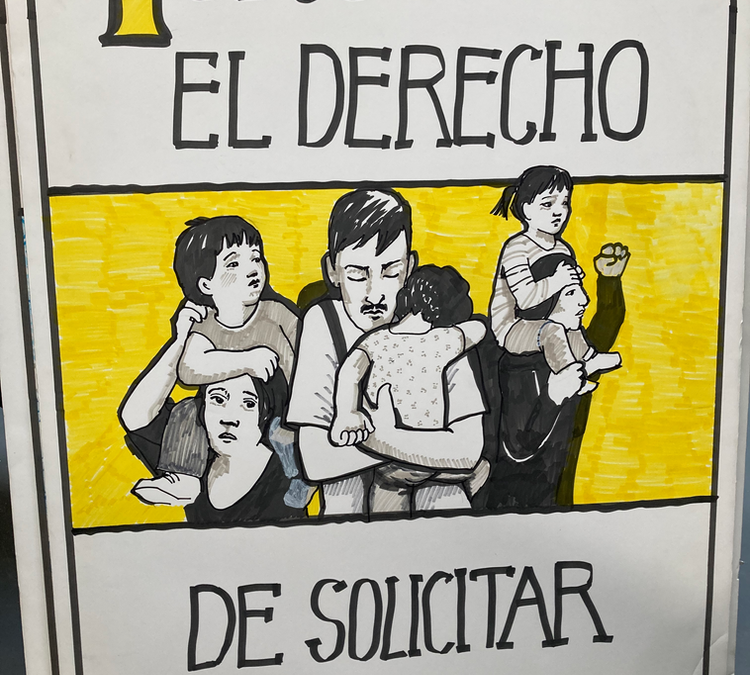Heart-to-Heart’s Lessons in Nonviolent Communication Showed Him the Path from Armed Robbery to Redemption
By Christopher Biddle, Heart-to-Heart Volunteer
May 2021
Heart-to-Heart News Merchantville, NJ

Khalil Williams is a modern-day prophet in a concrete wilderness. The sidewalks are his church.
Williams preaches the gospel of compassion, understanding and conflict resolution to at-risk youth—and anyone else who will listen— in the East Bronx.
His early years took him down a violent path that led him to a federal prison in South Jersey for armed robbery.
Today, he walks the same streets he did as a gang member, but now he seeks to deter others from taking the same path. Life behind bars, for all of its difficulties, gave Williams a rare opportunity. Thanks to the work of Heart-to-Heart, a nonprofit based in Merchantville, NJ, he learned about another way of life, one based on the nonviolent teachings of Mahatma Gandhi, the Rev. Dr. Martin Luther King and Marshall Rosenberg.
They offer combined workshops in yoga, meditation and Nonviolent Communication. In its stripped-down essence, this is the ability to listen and speak from the heart without judgement—and to find peaceful solutions to conflicts. Prison life is stressful, but it is also boring, and Williams was profoundly bored as he neared the end of his eight year sentence.

When he heard Heart-to-Heart was offering meditation, a long-time interest of his, he signed up. The program offered yoga and Nonviolent Communication workshops as well. That was OK with him. At first, he was skeptical. As a gang member, he understood vengeance. But feelings and emotions? The regular practice of meditation and Nonviolent Communications soon reached deep into Williams’ heart.
He stopped resisting and fully embraced a new language and a new way of living. He had taken his first steps to becoming a peace leader.
Peace Leaders
“Heart-to-Heart is preparing a new generation of Peace Leaders, people who are called to be a healing presence in the world.” Steve Tumolo, Executive Director and Co-Founder of Heart-to-Heart Inc.
Heart-to-Heart trains Peace Leaders. This is a principal mission of the South Jersey nonprofit, which also has a presence in Philadelphia, Maryland, and Massachusetts. Executive Director Tumolo and his team are now expanding their work from prisons into schools, workplaces and families.
Wherever disagreements flare up and feelings run high, wherever discussion gives way to shouting and hurt, lessons of the heart are needed. This is where Nonviolent Communication, developed by Dr. Marshall Rosenberg, comes in.
The goal of Nonviolent Communication is to listen, respect, identify needs, and find solutions. It’s all about peace.
“Peace is not simply the absence of conflict. It’s also a deep desire we have,” says Tumolo, who brought his program from New Mexico to South Jersey in 2008.
“Human beings come into life with core desires of the heart. We all want to be loved, to be respected, to have freedom. We are hard-wired for peace.”
These principles are developed in the book “Nonviolent Communication: A Language of Life”, written by psychologist Marshall Rosenberg, who was inspired by the lives and works of Gandhi and Dr. King. Heart-to-Heart primarily seeks to help the marginalized, those who have suffered physical and emotional trauma due to poverty, discrimination and like circumstances.
Their very survival often hinges on their ability to overcome big obstacles and conflicts. Heart-to-Heart’s newest program is called Heart-to-Heart Families. It brings the practice of Nonviolent Communication into the home. The nonprofit is also taking its message of peace into schools and workplaces. Oftentimes, Heart-to-Heart’s “graduates” carry their message of peace into their broader communities. These individuals are called peace leaders.
“Peace leaders are returning citizens, some of whom have spent decades in prisons and are now leading a path to peace in their communities, workplace, schools and homes,” Tumolo explains. Our peace leaders are survivors of violence and trauma, and our peace leaders are moms and dads, sowing the seeds of peace as they raise their children.”

Pull of the Street
Williams early life foreshadowed his time on the streets. His mother died when he was five. His father cared about him, but he was a drug addict, a big-time hustler and a restless rolling stone.
“The street just ate him up,” Williams recalls. Williams was taken in by his mother’s sister. She cared for him. She tried to keep him from the streets.
But he looked up to her boys, his older cousins. They were hard core. They worked the angles and brought in “loads of money.”
“They were already in the streets,” Williams says.
“This was the soil I was coming up in.” As a boy, he had a love affair with words. He liked to read, and he wrote stories about characters he made up in his head.
He had learned love and kindness from his mother.
He had learned about the importance of caring from his father, flawed as it was.
He had learned about benevolence and respect for family from his aunt. But the pull of the street was too strong. As a 12-year-old, he eavesdropped on his cousins. Their stories excited him. He later joined a street gang. Looking back on these years, Williams said the good he had learned as a boy “was submerged on the streets.” “I forgot about the fundamental part of me. The fundamental part was long gone. I was intrigued by everything that shined—the illusion of all that was going on around me.”
Williams’ career as a gang member came to an abrupt halt when he was arrested for armed robbery, convicted and sent to federal prison in his late 20s. Even before his sentencing, he realized the pain he had caused. While awaiting his turn in a Bronx courtroom, he saw a judge “give the hammer” to a young black teenager while a woman watching openly wept. “In that moment, what I saw was myself at that age in another courtroom in the very same building,” Williams recalls. Then and there, he decided to “do something” to change his life.
That something turned out to be the course in meditation, yoga and Nonviolent Communication offered by Heart-to-Heart at the federal prison. “I learned so much about myself,” Williams says. “As a result of that, it gave me an understanding that I’m not the only person in the equation. I need to consider how others might feel in an experience.”
Back on the Street
Following his release from prison, Williams stayed in touch with Heart-to-Heart, who had helped him reach back into his heart to recover his real self. He is working the streets again, but in a whole new way.

He no longer believes in taking an eye for an eye. Today, he seeks to replace acts of violence with acts of peace. He is guided by a strong belief in God and the common humanity of all people. He is married and the father of a three-year-old boy.
He started a nonprofit called I Am Magic that helps formerly incarcerated men and women find jobs. He works with another nonprofit called Bronx Connection that responds to street violence. Williams will pull up to the scene of a shooting and speak out against it.
He also acts as a mediator. “I do mediation when it comes to gang wars. I advocate for peace and some kind of common ground between two parties,” he says. “I just resolved something in my childhood neighborhood. I helped resolve a long-standing gang dispute.”
Williams’ idea of success is helping someone. He also counsels at-risk young men in their late teens to mid-20s. He coaches them, shows them another way, so they won’t get pulled into the streets. He relates easily to these young men.
He has credibility. As a former gang member who spent time behind bars, “my story is a little more believable.” He can read their words and body language, knows when they might be ready to listen. Then he encourages them to express themselves creatively, whether through music, dance or the arts.
“Once you have their attention, they can relate with you,” Williams says. “From there, everything is about self-actualization. I’m not teaching them to be selfish, but to believe in themselves. My thing is to hone in on their creative skills. Then a person is able to see: ‘I am able to do this. This is possible.”
He loves to read. He keeps a well-thumbed copy of Dr. Rosenberg’s book on Nonviolent Communication, which he has read and re-read. He has also written five short stories, a rekindling of his boyhood love affair with words. He hopes to turn these stories into street plays to share the power of what he likes to call “nonviolent expression.” “The streets are my stage. I have an abundance of places to share my story,” Williams says. “We’re going to be giving New York a magic show.”



